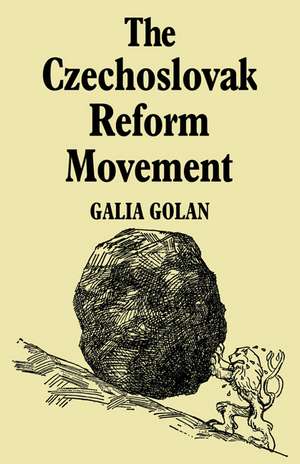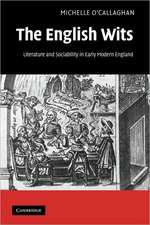The Czechoslovak Reform Movement: Communism in Crisis 1962–1968: Cambridge Russian, Soviet and Post-Soviet Studies, cartea 6
Autor Galia Golanen Limba Engleză Paperback – 13 oct 2008
Din seria Cambridge Russian, Soviet and Post-Soviet Studies
-
 Preț: 228.71 lei
Preț: 228.71 lei -
 Preț: 374.50 lei
Preț: 374.50 lei -
 Preț: 448.80 lei
Preț: 448.80 lei -
 Preț: 435.54 lei
Preț: 435.54 lei -
 Preț: 322.62 lei
Preț: 322.62 lei -
 Preț: 362.30 lei
Preț: 362.30 lei -
 Preț: 395.37 lei
Preț: 395.37 lei -
 Preț: 378.96 lei
Preț: 378.96 lei -
 Preț: 305.51 lei
Preț: 305.51 lei -
 Preț: 295.19 lei
Preț: 295.19 lei -
 Preț: 283.03 lei
Preț: 283.03 lei -
 Preț: 207.35 lei
Preț: 207.35 lei -
 Preț: 280.15 lei
Preț: 280.15 lei -
 Preț: 323.65 lei
Preț: 323.65 lei -
 Preț: 406.33 lei
Preț: 406.33 lei -
 Preț: 319.61 lei
Preț: 319.61 lei -
 Preț: 273.13 lei
Preț: 273.13 lei -
 Preț: 281.49 lei
Preț: 281.49 lei -
 Preț: 284.98 lei
Preț: 284.98 lei -
 Preț: 330.09 lei
Preț: 330.09 lei -
 Preț: 284.98 lei
Preț: 284.98 lei -
 Preț: 278.80 lei
Preț: 278.80 lei -
 Preț: 284.39 lei
Preț: 284.39 lei -
 Preț: 287.07 lei
Preț: 287.07 lei -
 Preț: 238.90 lei
Preț: 238.90 lei -
 Preț: 320.17 lei
Preț: 320.17 lei -
 Preț: 283.03 lei
Preț: 283.03 lei -
 Preț: 320.38 lei
Preț: 320.38 lei -
 Preț: 456.97 lei
Preț: 456.97 lei -
 Preț: 279.76 lei
Preț: 279.76 lei -
 Preț: 285.75 lei
Preț: 285.75 lei -
 Preț: 418.98 lei
Preț: 418.98 lei -
 Preț: 381.36 lei
Preț: 381.36 lei -
 Preț: 284.56 lei
Preț: 284.56 lei -
 Preț: 285.93 lei
Preț: 285.93 lei -
 Preț: 283.03 lei
Preț: 283.03 lei -
 Preț: 271.01 lei
Preț: 271.01 lei -
 Preț: 321.74 lei
Preț: 321.74 lei -
 Preț: 283.63 lei
Preț: 283.63 lei -
 Preț: 285.54 lei
Preț: 285.54 lei -
 Preț: 295.29 lei
Preț: 295.29 lei -
 Preț: 434.70 lei
Preț: 434.70 lei - 14%
 Preț: 825.10 lei
Preț: 825.10 lei
Preț: 319.40 lei
Nou
Puncte Express: 479
Preț estimativ în valută:
61.12€ • 63.97$ • 50.87£
61.12€ • 63.97$ • 50.87£
Carte tipărită la comandă
Livrare economică 31 martie-14 aprilie
Preluare comenzi: 021 569.72.76
Specificații
ISBN-13: 9780521085694
ISBN-10: 0521085691
Pagini: 360
Dimensiuni: 139 x 216 x 19 mm
Greutate: 0.46 kg
Editura: Cambridge University Press
Colecția Cambridge University Press
Seria Cambridge Russian, Soviet and Post-Soviet Studies
Locul publicării:Cambridge, United Kingdom
ISBN-10: 0521085691
Pagini: 360
Dimensiuni: 139 x 216 x 19 mm
Greutate: 0.46 kg
Editura: Cambridge University Press
Colecția Cambridge University Press
Seria Cambridge Russian, Soviet and Post-Soviet Studies
Locul publicării:Cambridge, United Kingdom
Cuprins
Part I. Introduction: 1956 to 1962: Part II. Events of 1963 – The Decision to De-Stalinize: 1. The Twelfth Party Congress and its Background; 2. Revolt of the Intellectuals; 3. Regime Response and Crisis; Part III. Economic Reforms: 4. Principles of the New System; 5. Planning and Organization of Industrial Production; 6. Economic Levers in the Industrial Sector; 7. Reforms in Other Spheres of the Economy; Part IV. Reforms in the Social-Cultural Spheres: 8. Mass Organizations; 9. Education; 10. The Arts; 11. Mass Communications; Part V. Political Reforms: 12. Ideology and the Party; 13. Elected Organs of Government; 14. Slovakia; 15. Legal System; Part VI. Events of 1967 – The Liberals Come to Power: 16. Pressures from the Economists; 17. Pressures from the Cultural World; 18. Pressures from the Slovaks and the Youth; 19. The Pressures Come to a Head; Part VII. Epilogue – January to August 1968: 20. An End and a Beginning; 21. Economic Reforms; 22. Social Organizations and Cultural Life; 23. Political Reforms; 24. Invasion.
Descriere
The `Prague Spring' was but the climax of a long, intensive struggle waged within the Czechoslovak party and society since 1956.















